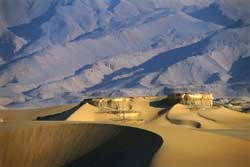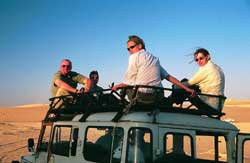|
The Western Desert
Safari
 The Western Desert covers 681,000 square kilometers over
two-thirds of Egypt’s total area. It is merely one part of the
Sahara belt across northern Africa. The Western Desert covers 681,000 square kilometers over
two-thirds of Egypt’s total area. It is merely one part of the
Sahara belt across northern Africa.
Only feasible for tourists since the 1980s, the Western Desert
Circuit is one of the finest journeys Egypt offers. Starting
from Cairo or Luxor, it runs for over 1000 km through a desert
landscape pockmarked by dunes and lofty escarpments. En route,
amid wind-eroded depressions, four oasis are sustained: Bahariya,
Farafra, Dakhla and Kharga.
Unlike Siwa, these :inner oasis “ have been almost continuously
under the control of the Nile Valley since the Middle Kingdom,
ruled by the Pharaohs, Persians, Romans, Mamelukes and Turks,
who have their mark in the form of temples, tombs, forts,
mosques or roads.
 Although each oasis has a central focus, the differences between
them are as marked as their similarities. Although each oasis has a central focus, the differences between
them are as marked as their similarities.
Bahareya and Farafra both score highly on their hot springs and
palm groves, but Bahareya seems corrupted by Cairene ways and
tourism, whereas Farafra is more rural and traditional.
In Dakhla and Kharga the modern centers are less appealing than
the ancient ruins and villages on their periphery, redolent of
historic links with the Nile Valley or caravan routes from the
Sudan.
Staying overnight in the haunting White Desert between Bahariya
and Farafra is a must.
 Siwa Oasis lies far out near the Libyan border. Its people speak
another language and have customs unknown in the rest of Egypt.
Its ruined citadels, lush palm groves, limpid pools and golden
sand dunes epitomize the allure of the oasis. Siwa Oasis lies far out near the Libyan border. Its people speak
another language and have customs unknown in the rest of Egypt.
Its ruined citadels, lush palm groves, limpid pools and golden
sand dunes epitomize the allure of the oasis.
Much nearer to Cairo are two quasi-oases: Fayom and Wadi Natroun.
The Fayoum is more akin to the Nile Valley than the Western
Desert, which many ancient ruins to prove its importance since
the Middle Kingdom. Wadi Natroun is significant mainly for its
Coptic monasteries
Popular Safari Places in Western Desert : |